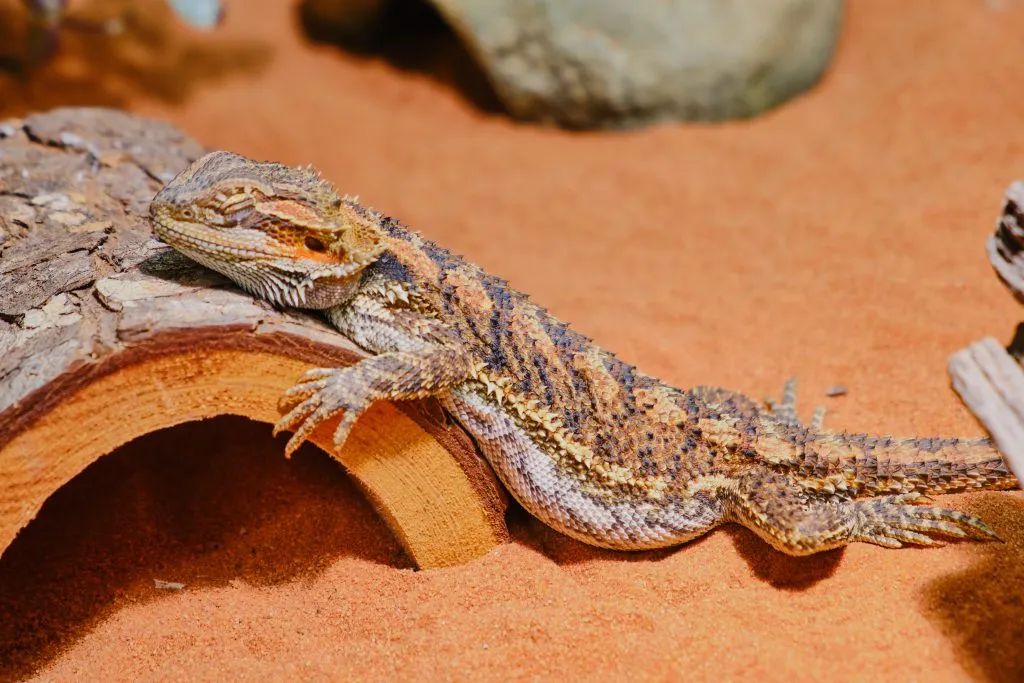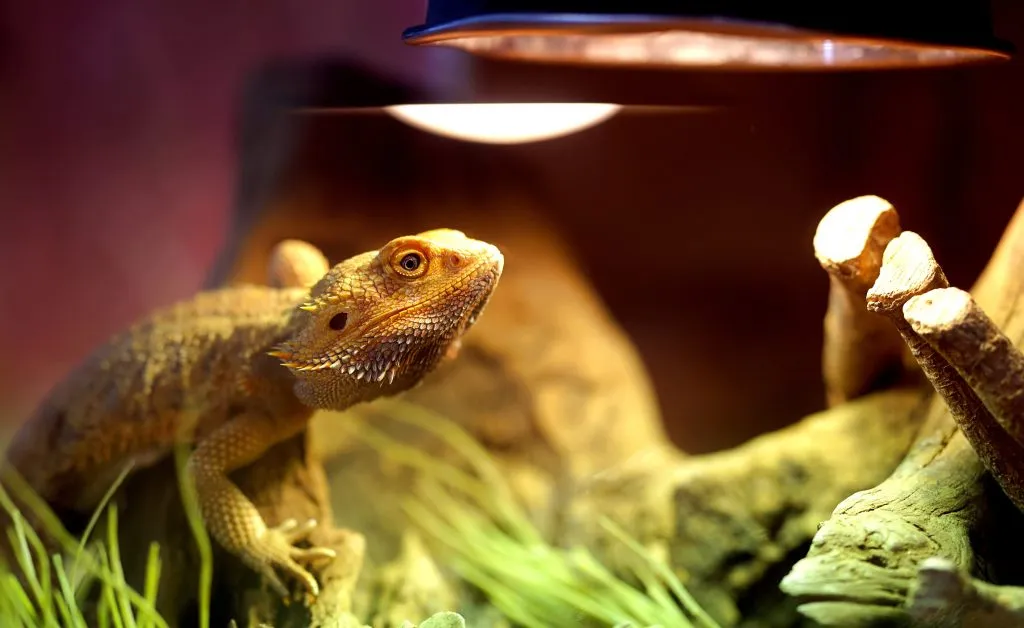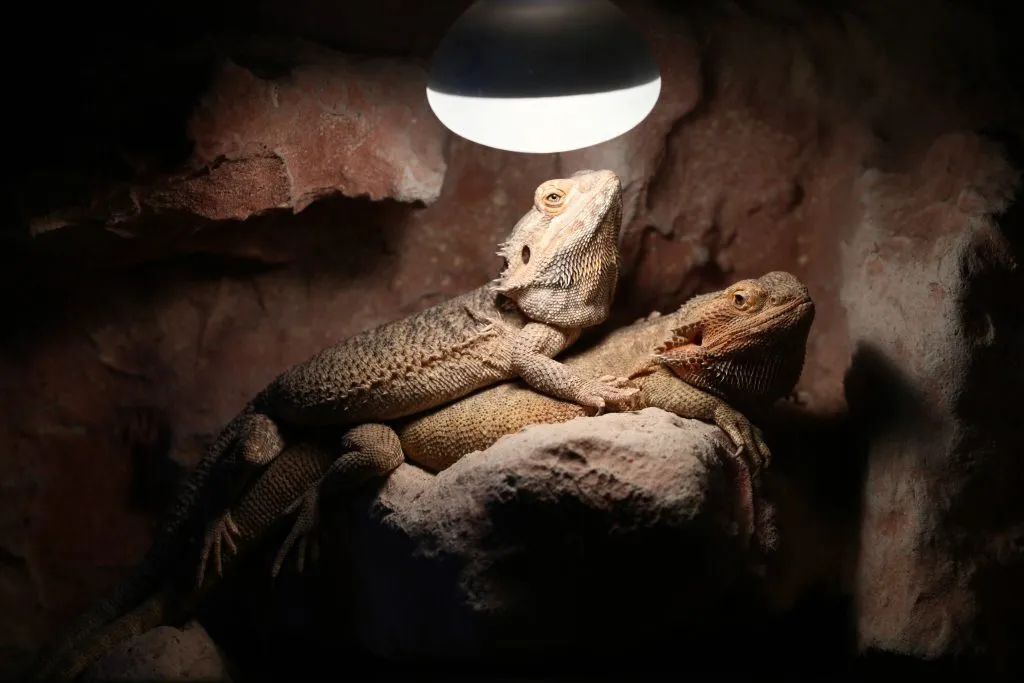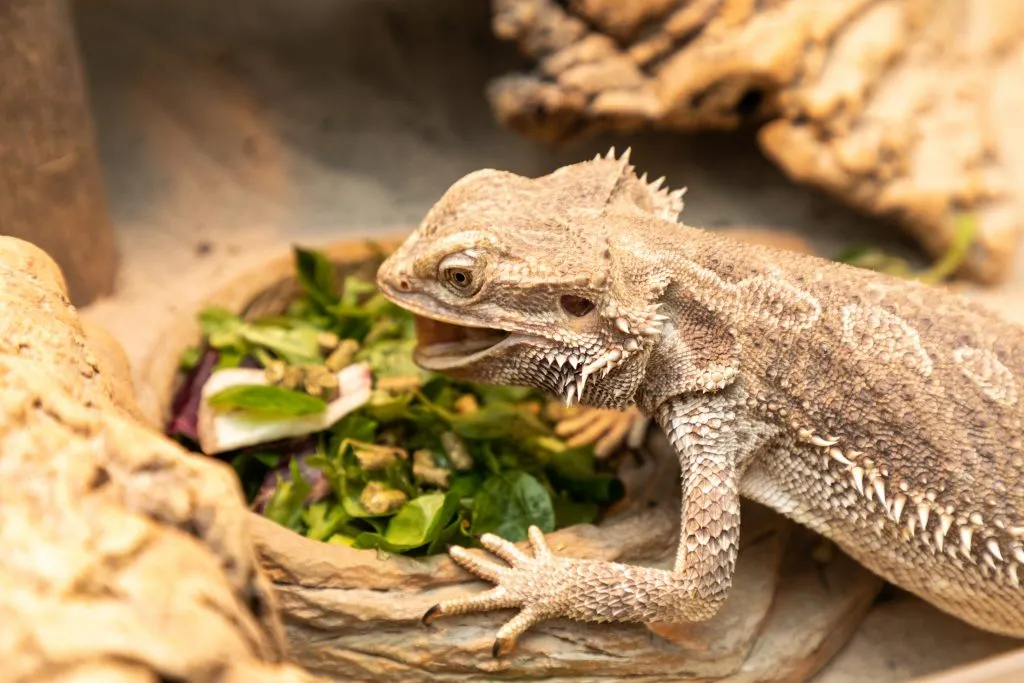
Should you buy a night light for your bearded dragon? Is it okay to give them a blue light so you can still view them at night? Proper lighting is essential to your bearded dragon’s health as it affects its circadian rhythm. So would a night light benefit them?
Bearded dragons do not need a night light. Using a light at night will disrupt their sleep cycle as they are diurnal reptiles. They need 8-12 hours of sleep at night which any light will disturb. Also, they do not need heating at night except in cases of temperature drops.
As you can see, bearded dragons are much like humans when it comes to our sleep cycles. Any sight of light is their cue to wake up, and complete darkness is their sign to sleep. Keep on reading to find out more about how to properly mimic their environment in the wild.
Table of Contents
Do Bearded Dragons Need A Night Light?
Bearded dragons will not benefit from a night light. In fact, having a night light will make them more tired and irritable as they cannot sleep properly.
They are diurnal reptiles which means that they are awake during the daytime and asleep at nighttime. Even though they are in captivity, it is our job as beardie owners to mimic their natural environment in the wild. Thus, there should be no lights at night!
This means that you should turn off their basking light, UVB light, and even your heat emitters (if you live in cold areas) in order to mimic the lighting in their natural habitat.
In this study, it was found that bearded dragons have a sleep pattern that is similar to mammals. They experience a slow wave sleep as well as rapid eye movement sleep.
In order to achieve deep sleep, they need the right environment ie: a slow drop in temperature and darkness.
What Time Should I Turn My Bearded Dragon’s Light Off At Night?

A good rule of thumb as to when you should switch the lights off is when it is around the time that the sun sets. This varies from one country to another.
For most states in the United States, the sunset is between 4:30-5:30 pm. As for countries in Europe, it is usually 4:00-6:00 pm. It is best to check when the sun sets in your area, for the sake of accuracy.
Of course, as we live busy lives, it is inevitable that we will forget to turn off or even turn on the lights in the enclosure of our bearded dragons.
In the event that we do this, we are not only disrupting their circadian rhythm, but we are also paving the way for them to get a respiratory infection.
In order for you to not commit this mistake, you can make use of a timer so that the lights can be automatically switched off.
This one from Zilla has many outlets that can also be used with different enclosures. You just need to set the mode for the days, hours, and minutes.
Here is a lighting schedule you can follow depending on the current season. These time signatures are the ones that you are going to input in your time switch.
| Season | Number Of Hours |
| Summer | Day: 14-16 hours of daytime and UVB light Night: 8-10 hours of no lights |
| Winter | Day: 10-12 hours of daytime and UVB light Night: 12-14 hours of no lights |
You will notice that during winter, the hours of their nighttime exposure are increased. This is due to the fact that nights are longer during winter.
Again, we are trying to mimic our beardie’s natural environment, thus the need to adjust the nighttime hours.
I Left My Bearded Dragon’s Lights On All Night! What Now?

There is no need to panic when this happens, as, for the most part, your bearded dragon will still be fine. You will notice that it is just tired as it was not able to get proper sleep.
However, lack of sleep and general tiredness may also lead your bearded dragon to refuse
Important note: When you forget to turn off the lights at night, never turn off the lights during daytime to compensate for the lack of nighttime exposure. Instead, keep up with the lighting schedule so as not to disrupt the day and night cycle of your bearded dragon.
Will My Bearded Dragon Be Too Cold Without A Night Light?
Your bearded dragon will not be cold without a night light. Given that the temperature during the day for the basking spot is around 108-113 °F and the cool spot between 77-85 °F, your beardie has been exposed to enough heat to withstand the temperature drop during nighttime.
The nighttime temperature of the enclosure, when given the above parameters, will remain between 65-75 °F. This temperature is still comfortable for your bearded dragon, even without the use of light and heat.
The lowest temperature that bearded dragons can safely survive is 65 °F.
Of course, the temperature will vary if you live in a cold area. Some owners make use of black light which is a type of light that emits heat and not light. Others use ceramic heat emitters.
There is no problem with using these if you reside in a cold area. However, you should still be mindful that these bulbs and emitters can sometimes breach the 75 °F nighttime temperature.
This is the reason why some owners who are in colder areas prefer to leave the day lights and UVB lights on for an extra hour.
Note: If you want to learn more about this, read our article: Do beardies need heat at night?
Do Bearded Dragons Need Complete Darkness To Sleep? What About Blue Lights?
Although blue lights are known to be less disruptive to bearded dragons as compared to red and white lights, it is still not recommended to keep any lights on at night.
This may come as bad news to those who still want to view their beardies at night, but surrendering to our whims will simply not benefit our beardies.
Any colored light can be easily detected by your beardie’s eyes, tricking it that it is not yet time to sleep. This will hinder the release of hormones that trigger your beardie to sleep, which will affect their night cycle.

Does this mean that we should strive for complete darkness? If it is possible, yes.
Tip: In our guide about the best heat lamps for bearded dragons, we also listed a heat emitter that can be used during the night since it doesn’t give off any light.
In cases where the enclosure is near a window where the outdoor lights can peak through, just as long as there is no direct light hitting the enclosure, it is still fine.
For good measure, you can cover a part of the enclosure with a cloth if you think that the excess light may change the temperature of the
But even without achieving total darkness, your beardie will still be okay as in the wild, they still have the glimmer from the moon and the stars, right?
Also, just get a hide like this one so your beardie can sleep in total darkness if it prefers to.
How Long Do You Have To Leave The Light On After Your Bearded Dragon Ate?

In the event that you feed your bearded dragon at night (after the sun sets), it is best to leave the lights on for at least one hour after feeding.
This will ensure that your beardie has enough heat and light to aid in digesting its
When this is not done when you do your feedings at night, your bearded dragon may become bloated or even impacted as it does not have enough access to heat.
One hour after feeding is more than enough heat and light to help with digestion, within which you can switch the lights off.
On the other hand, it is not good practice to turn off the lights at night, only to turn them on again for a feeding.
This will disrupt their night cycle. Also, the rapid dropping and raising of the temperature will not be good for your beardies.
Make sure that when you switch off the lights, you have done everything necessary for your bearded dragon so that you do not need to turn them on again.
Conclusion
Bearded dragons do not need nightlights. They need 8-10 hours of darkness in order to sleep properly. During this time, the temperature will drop to 55-75 °F, given that they are exposed to the right temperatures during the daytime.
There is no need to worry that your beardie will be too cold when there are no lights at night, just as long as during the day, you were able to maintain the proper temperature.
Hold off on night viewing with the use of colored lights as this will disrupt the sleep cycle of your beardie. If you really want to see your beardie at night, it is best to do so without light and just examine the enclosure up close.
- Enchi Ball Python: A Unique and Stunning Morph of Python regius - March 27, 2025
- Emerald Tree Monitor: The Enigmatic Green Guardian of the Rainforest - March 26, 2025
- The Egyptian Cobra (Naja haje): A Fascinating Serpent - March 25, 2025
